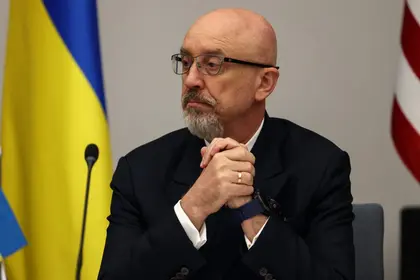As its Western partners highlight areas to be reformed to enable Ukraine’s integration into Europe and NATO, Kyiv is battling the risk of corruption in its military supply chains, according to its defense minister.
Speaking at a Ukrinform media briefing yesterday Wednesday, July 19, Oleksii Reznikov, Ukraine’s senior defense official, said that organizational change was his main weapon to fight against the potential for corruption in the processes used to procure materiel for the military.
- Access the newest Ukraine news items published today.
- Access the latest Ukraine news coverage for today.
JOIN US ON TELEGRAM
Follow our coverage of the war on the @Kyivpost_official.
“At present, we are on the path of transferring procurement functions from the departments of the Ministry of Defense to service agencies,” Reznikov said.
Having faced corruption allegation scandals involving his department earlier this year, the Minister outlined the current reform of roles and responsibilities within the defense procurement organization.
“A first set of service agencies will undertake planning, standardization, and quality control in cooperation with the Armed Forces of Ukraine. Then, commercial aspects will be handled by separate appropriate agencies, including the one already established for defense purchasing,” Reznikov said.
He added that the appropriate legislative changes are also being worked on to bring about an adequate “checks and balances” approach to defense procurement.
The Minister noted that increased digitization of logistical supply chains provided an additional element of his strategy to reduce the risk of corruption when buying weapons and supplies for Ukraine’s military.

ISW Russian Offensive Campaign Assessment, December 24, 2024
“This will make it possible to raise the level of absolute transparency, control, responsibility and minimize any potential for corruption,” the Minister said according to Ukrinform.
On March 21, President Volodymyr Zelenskiy signed into law a bill that mandated, from June 20, the publication of prices for all military purchases, apart from weapons, in the electronic procurement platform ProZorro.
Reznikov also told journalists that his team with is “actively cooperating” with Ukraine’s official anti-corruption bodies.
“We have common goals and common values,” he said.
Earlier this year, Ukrainian defense ministry officials, including a Deputy Minister, were fired amid scandals involving alleged price gouging in contracts awarded for the provision of food and catering for Ukrainian troops.
The allegedly high price for one commodity for the military, eggs, became a massive trope and meme generator in Ukrainian society.
In April, RFE/RL’s investigative branch found that “at least four additional major contractors also charge the Defense Ministry above-market rates for the provision of key foodstuffs to Ukrainian troops.”
RFE/RL’s Schemes unit said that “the prices at which suppliers are prepared to deliver potatoes, apples, cabbage, and eggs to the Ukrainian armed forces often range from two to three times the level of the purchase price”.
Experts have noted the risks in the wartime context presented by the combined challenges of getting urgent supplies, maintaining high-levels of operational secrecy, and combating corruption.
“All corruption and price gouging deserves to be investigated and punished, of course — especially in a country where each stolen dollar weakens the war effort,” Adrian Karatnycky wrote in Politico.
“Nevertheless, given the scale of a war-time budget, which takes up the lion’s share of the state’s expenditures and resources, it’s important to realize that such incidents are likely unavoidable, even with the best systems of control and audit in place,” he said.
You can also highlight the text and press Ctrl + Enter






